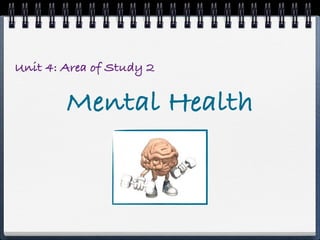
Lesson 1 normality
- 1. Unit 4: Area of Study 2 Mental Health
- 2. Before we begin.... There are 16 million Australians aged between 16 and 85 years of age. Of these, almost half (45%) have had some sort of mental disorder at some point in their lives. It is very important that we spend the next few weeks studying his topic from a scientific point of view. Try not to self-diagnose, or to diagnose those around you. If something we cover DOES hit a nerve, please remember to talk it through with someone. Speak to your teacher , a support person in senior school - but please speak to someone! Self disclosure - the classroom environment is not a good setting to tell personal stories. Be aware of what you are saying and the impact it may have on others around you.
- 3. Why?? Compassion - a deep awareness of and sympathy for another’s suffering Empathy - the capacity to recognise and, to some extent share feelings that are being experienced by another
- 4. Lesson 1: Normality Objectives: Using examples explain the concepts of normality including: Statistical, Medical, Situational, Historical, Functional, Sociocultural Differentiation of mental health from mental illness
- 5. Defining Normality 6 Approaches: Socio-Cultural, Functional, Statistical, Medical, Situational & Historical
- 6. Socio-Cultural Thoughts, feelings and behaviour that are appropriate in a particular society or culture are considered normal, those outside are considered abnormal E.G. In some cultures loud crying and wailing at a funeral of a stranger is expected, whereas in others it would be seen as abnormal
- 7. Functional Thoughts, feelings and behaviours are considered normal IF the individual can function independently in society
- 8. Historical What is considered normal or abnormal in a society depends on the era/period of time when the judgement is made. E.G. School students used to get hit on the knuckles with a cain when they misbehaved, now this would be considered abnormal or wrong!
- 9. Situational Thoughts, feelings behaviours might be considered normal in one situation but not another. E.G. Wearing your pyjamas to school is abnormal,but wearing them at home is not.
- 10. Medical Abnormal thoughts, feelings or behaviour are viewed as having an underlying biological cause and can usually be treated with medication. E.G. Certain abnormal behaviours can lead to the diagnosis of Schizophrenia which has a neurochemical basis and can be treated with medication.
- 11. Statistical If a large majority of people (the statistical average) thinks feels or behaves in a certain way, this is considered normal. E.G. To laugh when told a joke - normal and most people do this, to laugh at a funeral - abnormal, a small minority do this (the statistical extremity)
- 12. Tackling a man to the ground Normal Abnormal Which approach to normality is being used here?
- 13. Buddist monk performing an exorcism Uni girls having a break between lectures Normal Abnormal Which Approach??
- 14. On their own, none of these approaches is entirely satisfactory. But they have worked together to contribute to an understanding of normality and abnormality So what is normal? Normality ~ A pattern of thoughts, feelings or behaviour that conforms to a usual, typical or expected standard within a cultural context Abnormality ~ A pattern of thoughts, feelings or behaviour that is deviant, distressing or dysfunctional
- 15. According to the World Health Organisation (WHO) (1998) Mental Health is a state of emotional and social well-being in which individuals realise their own abilities, can cope with the normal stresses of life, can work productively and can contribute to their community. Mental Health There are degrees of mental health. We may experience mental health problems when we have extra stress in our lives. E.g.* Family situation changes *We break up with a partner *Lose money *Exams
- 16. Mental Illness ~ a psychological dysfunction experienced by an individual and usually involves distress, impairment in the ability to cope with everyday life, and thoughts, feelings and /or behaviour that are not typical of the person or appropriate in their culture The nature and severity of a mental illness may vary from person to person. * Many only have one short-lived episode and fully recover * Others may have a lifetime battle with mental illness With psychological support and (often) medication, the majority of people living with a mental illness can lead full, active and successful lives
- 17. Mental health professionals use the term MENTAL HEALTH PROBLEM when the difficulties experienced by a person are mild, temporary and able to be treated in a relatively short time The term MENTAL ILLNESS is more likely to be used when the difficulties are more serious, are likely to persist for a long time and requires a longer term treatment plan
- 19. Psychological Dysfunction ~ a breakdown in cognitive, emotional and/or behavioural ‘functioning’ thereby interfering with an individual’s ability to adjust to the challenges of everyday life. Mental illness primarily involves our mind, but can affect our physical health just as out physical well-being can affect our mental health
- 20. Essential Learning Activities Activity 1: Construct a concept map differentiating between mental health, mental health problem, mental illness, and psychological dysfunction Activity 2: Create a digital resource that explains one of the approaches to defining normality. Below under 'podcasts' are examples from students last year. Use these as a standard to guide your resource. Where do these fall short? Make a better one!!!